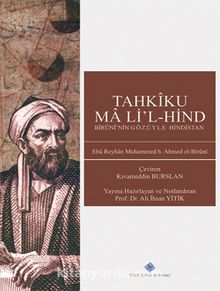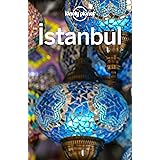Alberuni’s India
Alberuni’s India, London: Kegan Paul, Trench, Trübner & Co., 1910
The Hindus believe with regard to God that he is one, eternal, without beginning and end, acting by free-will, almighty, all-wise, living, giving life, ruling, preserving; one who in his sovereignty is unique, beyond all likeness and unlikeness, and that he does not resemble anything nor does anything resemble him.
Vol. I, p. 27, quoted in James W. Laine, “The dharma of Islam and the dīn of Hinduism: Hindus and Muslims in the age of Śivājī”, International Journal of Hindu Studies, vol. 3, no. 3, 1999.
A famous idol of theirs was that of Multan, dedicated to the sun. When Muhammad Ibn Alkasim Ibn Almunabbih, conquered Multan, he inquired how the town had become so very flourishing and so many treasures had there been accumulated, and then he found out that this idol was the cause, for there came pilgrims from all sides to visit it. Therefore he thought to build a mosque at the same place where the temple once stood. When then the Karmatians occupied Multan, Jalam Ibn Shaiban, the usurper, broke the idol into pieces and killed its priests. When afterwards the blessed Prince Mahmud swept away their rule from those countries, he made again the old mosque the place of the Friday-worship.
Alberuni in his India, Alberuni’s India, Edward C. Sachau (translator and editor)
The linga he raised was the stone of Somnath, for soma means the moon and natha means master, so that the whole word means master of the moon. The image was destroyed by the Prince Mahmud, may God be merciful to him! – AH 416. He ordered the upper part to be broken and the remainder to be transported to his residence, Ghaznin, with all its coverings and trappings of gold, jewels, and embroidered garments. Part of it has been thrown into the hippodrome of the town, together with the Cakrasvamin, an idol of bronze, that had been brought from Taneshar. Another part of the idol from Somanath lies before the door of the mosque of Ghaznin, on which people rub their feet to clean them from dirt and wet.
E.C. Sachau (tr.), Alberuni’s India, New Delhi Reprint, 1983
The city of Taneshar is highly venerated by Hindus. The idol of that place is called Cakrasvamin, i.e. the owner of the cakra, a weapon which we have already described. It is of bronze, and is nearly the size of a man. It is now lying in the hippodrome in Ghazna, together with the Lord of Somanath, which is a representation of the penis of Mahadeva, called Linga.
E.C. Sachau (tr.), Alberuni’s India, New Delhi Reprint, 1983 p. 117.
Mahmud utterly ruined the prosperity of the country, and performed there wonderful exploits, by which the Hindus became like atoms of dust scattered in all directions, and like a tale of old in the mouth of the people. Their scattered remains cherish, of course, the most inveterate aversion towards all Muslims…. Hindu sciences have retired far away from those parts of the country conquered by us, and have fled to places which our hand cannot yet reach, to Kashmir, Benaras and other places. And there the antagonism between them (the Hindus) and all foreigners receives more and more nourishment both from political and religious sources
Alberuni’s India, vol. I, p. 22. Also quoted (in part) in Jain, Meenakshi (2011). The India they saw: Foreign accounts.
The Hindus do not pay particular attention to alchemy, but no nation is entirely free from it, and one nation has more bias for it than another, which must not be construed as proving intelligence or ignorance; for we find that many intelligent people are entirely given to alchemy, whilst ignorant people ridicule the art and its adepts.
Alberuni, quoted from Lal, K. S. (1992). The legacy of Muslim rule in India. New Delhi: Aditya Prakashan. Chapter 1
The Hindus believe that there is no country but theirs. no nation like theirs, no king like theirs, no religion like theirs, no science like theirs.
Alberuni, I, p.22. quoted from K.S. Lal, Indian Muslims who are they, 1990
They (the Hindus) differ from us in religion… There is very little disputing about theological topics among themselves; at the most they fight with words, but they will never stake their soul or body or their property on religious controversy. … in all manners and usages they differ from us to such a degree as to frighten their children with us… and as to declare us to be devil’s breed and our doings as the very opposite of all that is good and proper, ….they call all foreigners as mleccha, i.e. impure, and forbid having any connection with them, be it by intermarriage or any other kind of relationship, or by sitting, eating, and drinking with them, because thereby they think, they would be polluted… They are not allowed to receive anybody who does not belong to them, even if he wished it, or was inclined to their religion.
Alberuni, I, pp.19-20. quoted from K.S. Lal, Indian Muslims who are they, 1990
“Its (Rasayan’s) principles (certain operations, drugs and compound medicines, most of which are taken from plants) restore the health… and give back youth to fading old age… white hair becomes black again, the keenness of the senses is restored as well as the capacity for juvenile agility, and even for co-habitation, and the life of the people in this world is even extended to a long period.”
quoted from Lal, K. S. (1992). The legacy of Muslim rule in India. New Delhi: Aditya Prakashan. Chapter 1 [1]
The repugnance of the Hindus against foreigners increased more and more when the Muslims began to make their inroads into their country.
in Elliot and Dowson, quoted in Misra, R. G. (2005). Indian resistance to early Muslim invaders up to 1206 A.D. p.111
https://en.wikiquote.org/wiki/Al-Biruni




















